In April this year we announced that K-root would open up for expansion to new locations. Since then we have added 17 additional K-root hosted nodes. Now is a good point in the expansion of K-root for us to provide a short update.
In an earlier article on RIPE Labs we announced the coverage expansion of the K-root service . Our motivation for the expansion of K-root was to improve the global coverage and overall robustness of K-root, therefore we were looking to expand particularly in those locations where the reachability of K-root was low.
Since the beginning of the expansion project we have been able, with the help of many enthusiastic new hosts, to add 17 new K-root hosted nodes. In most cases the installation process went very smoothly, allowing us to bring the new node into operation within a couple of hours of it becoming available to us.
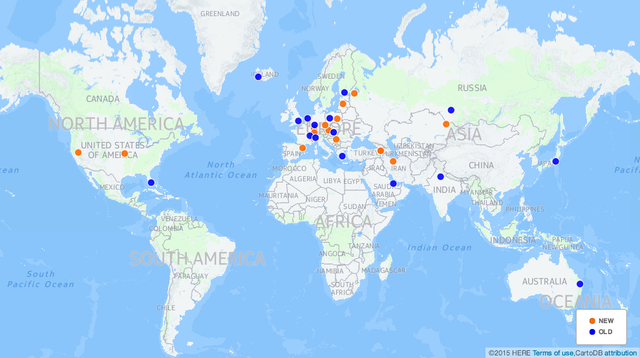
Figure 1: Old (blue) and new (orange) K-root instances
One of our concerns was that a very high uptake for adding new K-root nodes would overwhelm our team's capacity to handle new installations quickly. For this reason we wanted to pace the rollout by grouping the new hosts and focussing on under-served areas and on our service region. In retrospect there was little reason for this concern, because the rate of uptake we saw was good but was not overwhelming. We can happily say that we have been able to handle all requests so far. The list of all newly added locations is given below.
| Country | City | Hosting organisation |
| Armenia | Yerevan | Internet Society Armenia |
| Armenia | Abovyan | GNC-Alfa CJSC |
| Austria | Vienna | Vienna University |
| Austria | Vienna | Anexia |
| Czech Republic | Prague | CZ.NIC |
| Germany | Karlsruhe | 1&1 Internet AG |
| Iran | Tehran | ITC |
| Iran | Tehran | Asiatech |
| Kazakhstan | Semey | KazNic |
| Latvia | Riga | University of Latvia |
| Poland | Warsaw | Wiollo Sp |
| Russia | Saint Petersburg | Selectel LLC |
| Serbia | Belgrade | Serbian Open eXchange |
| Spain | Barcelona | CSUC |
| Switzerland | Zurich | SwissIX |
| U.S.A. | Kansas City | 1&1 Internet AG |
| U.S.A. | Reno | TahoeIX |
All of these additional nodes have been kindly funded (hardware, colocation and network) by the local hosts. This of course means that we have little direct control over the locations where new K-root nodes are being proposed. However, if we look at the list of new locations it is clear that there is a good geographical spread and that nodes have mostly been added in regions where K-root reachability can be expected to improve by adding a new node.
As part of the rollout process, we investigate the new node’s impact on the overall K-root reachability and performance. If necessary, we work with the local host to tune the propagation of the K-root prefix from the new location. Additionally, we analyse, on a semi-regular basis, the current state of K-root reachability in the various regions and its development over time. For example, in October 2014 we published our K-root IPv4 regional measurement results on RIPE Labs. We have recently performed another such analysis. The results have been published in a separate RIPE Labs article: Impact of K-root Expansion as Seen by RIPE Atlas .
One high level observation from this analysis that we can share already is that the new nodes in the Middle East, Russia and the CIS states have been very effective in improving reachability in their respective regions. This is illustrated in diagram 1 below.
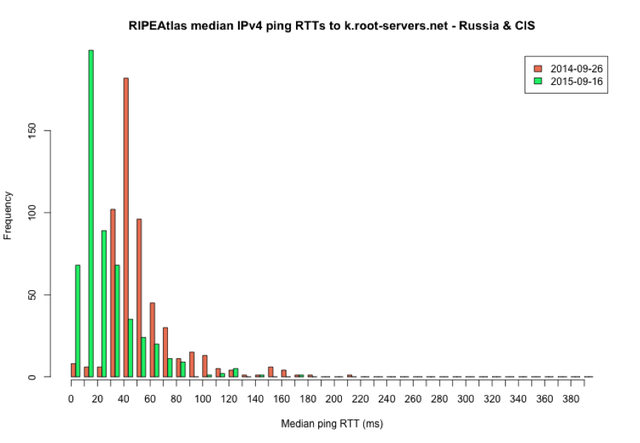
We have also seen that the added nodes in Iran have been able to improve reachability of K-root in Iran to a significant degree. A report by Dyn discussed the visibility and reachability of one of the Iran nodes as seen from India. We also published a separate analysis about this .
Conclusion
The expansion of K-root has been successful during its first half-year. We have added 17 new nodes and are open to adding more locations. If your organisation is interested in hosting a K-root node, you can find more information in the
K-Root Expansion Plan
. Specifically, a
ny organisations in the Middle East, Turkey, Eastern Europe, Scandinavia or Iberia that are interested in and capable of
hosting a K-root node
are welcome to get in touch with the RIPE NCC.


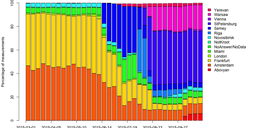

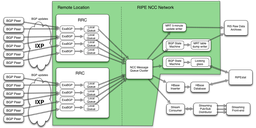

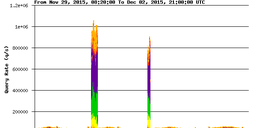
Comments 2
Comments are disabled on articles published more than a year ago. If you'd like to inform us of any issues, please reach out to us via the contact form here.
Konstantin Bekreyev •
I see K-ROOT via Selectel by IPv4: 20485 49505 25152 but not by IPv6: 20485 25152 (this is denic)
Romeo Zwart •
Hi Konstantin, A quick cross-check on RIPEstat (https://stat.ripe.net/widget/asn-neighbours#w.resource=AS49505) shows that the peering between Selectel (AS49505) and Transtelecom (AS20485) is IPv4 only. So if you are in AS20485 you might not even see the Selectel K-root node via IPv6. Kind regards, Romeo